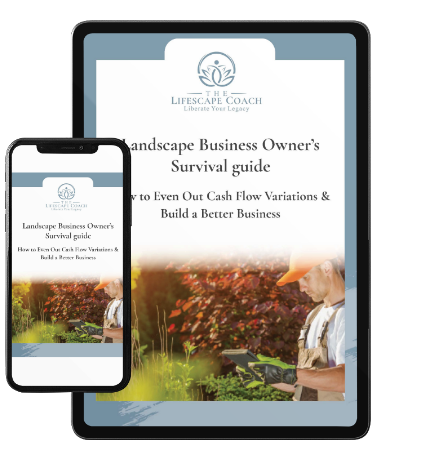Learning to Cope: 3 Tips to help you take a temporary step away from your landscape business
John Lennon once famously said, "Life is what happens while you are busy making other plans." This, unfortunately, can be true for running a landscaping business. Sometimes life simply gets in the way and derails even the best-laid plans – unexpected medical emergencies, family calamities, and other "whoa, I wasn't expecting THAT" moments that can require you to let go of the reins and depend on others temporarily to take care of the daily business needs.
So, if you have to step away from your landscape business because of a life event, who has your back?
If you’ve done your homework right in setting up your business and hiring the right people, your team is already aligned with the business in general and each other in particular. They’ve got the synergies that enable them to say “no problem, we’ve got this.”
But that synergy also has to extend beyond your team to your clientele. The winning ingredient here is your relationship with your clients, whom you’ve hyper-selected to enable you to do the kind of work you want and that they value. Together, these three critical elements – your organization (systems and processes), your team, and your clientele – provide the stability that will enable your business to weather adversity and cope admirably during events that might cause you to have to step back for a while and focus on other things.
Here are three tips to help you structure your landscape business to create just that kind of stability:
Tip #1: Get organized.
How organized are you? If you’re like many small-to-medium sized landscape businesses, chances are good you’re wearing too many hats. Are you scheduling work, ordering materials, paying bills, answering calls, and still picking up a shovel or running equipment? Then you need to fix that my friend.
A well-organized business is one that has clearly articulated roles within its structure – and that means delegating. Because if life does suddenly get in the way, your business will grind to a halt if you were responsible for everything. It's essential to determine which employees are capable of stepping up and bearing more of the load to ensure that balls aren't dropped when you have to step away. You may even be pleasantly surprised at how willing some people are to accept more responsibility.
Tip #2: Build the best team.
Hiring people because you need warm bodies and additional sets of hands may be okay in a pinch, but it’s no way to build a real team. Hiring the right people, building relationships with them, and supporting them (and your business) with training will pay off big time when you find yourself in a bind and need to depend even more on them.
For example, scheduling seems like a simple task, but if no one else has the ability or authority to make a schedule then work won't get done when you’re not there. If you ask team members to do tasks with you, such as walking through properties and scheduling work as a part of regular training, then if the time comes when you have to step away, you can rest easy knowing someone else can get things done.
By delegating and sharing responsibilities with your team, they will learn what to do when normal stuff happens in the business. Such as when a truck breaks down or a worker calls in sick – your employees see how to properly respond, gaining confidence in their abilities and a sense of responsibility for helping run the business.
Tip #3: Cultivate the right clients.
We are all guilty at some point of taking any client who will hire us. It is a kind of self-employment rite-of-passage – we’re happy to take anyone who will write us a check. However, that can lead to counterproductive relationships with clients who are geographically or philosophically distant from your business goals. You need to chart a course that will help you discover and cultivate a clientele that’s a perfect fit for your company and what you want it to be. That way, when you have to step away from your business because of life’s curveballs, you have a solid, supportive client base and a team that works well with them so that things will go smoothly while you’re gone.
Having a top-tier client list is helpful for your company in many ways:
- They’ll stick by you when times are tough
- They welcome your honesty, even when the news may not be what they want to hear
- They trust your team as much as they trust you, so there’s no problem passing the baton periodically when life requires it
Three solid legs to stand on.
I learned from first-hand experience that everything we’ve talked about in this post is true. When I had to unexpectedly step away from my landscape business for two solid weeks, I leaned heavily on my business organization and my team for help.
Even with some glitches in our organizational structure (yeah, we aren’t perfect either), everyone stepped up because they knew they had to, but more importantly, because they were willing and able to do so. Good communications kept our clients in the loop. They, in turn, threw their support behind our business and were willing to cut the necessary slack we needed during those two weeks. My business is now stronger and better because these three elements clicked when they needed to.
There’s one other thing I learned, too. And that is that emotion cannot be turned off and shelved during a personal trial. You have to embrace what you’re feeling and bring that vulnerability along with your bravery and the truth about what you’re going through. Let your organization and team carry you for a bit. Be straight up about everything and trust those three critical elements – organization, team, clients. You’ll be surprised at the strength that will shine through.
Landscape Business Owners Survival Guide



